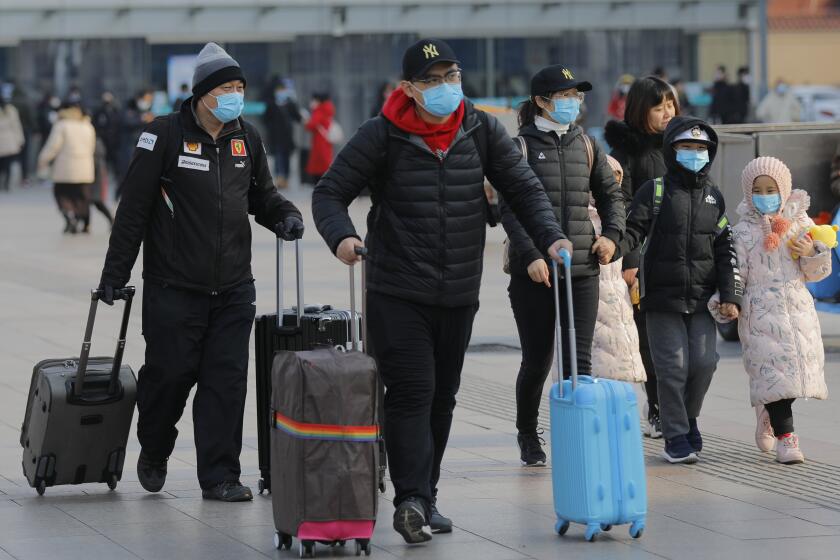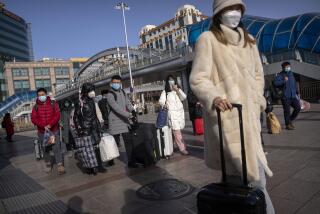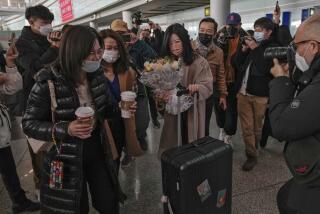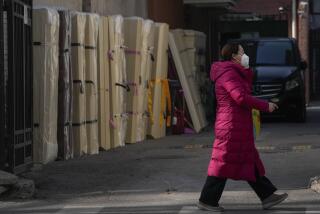China extends holiday to contain virus as death toll rises; Mongolia closes border
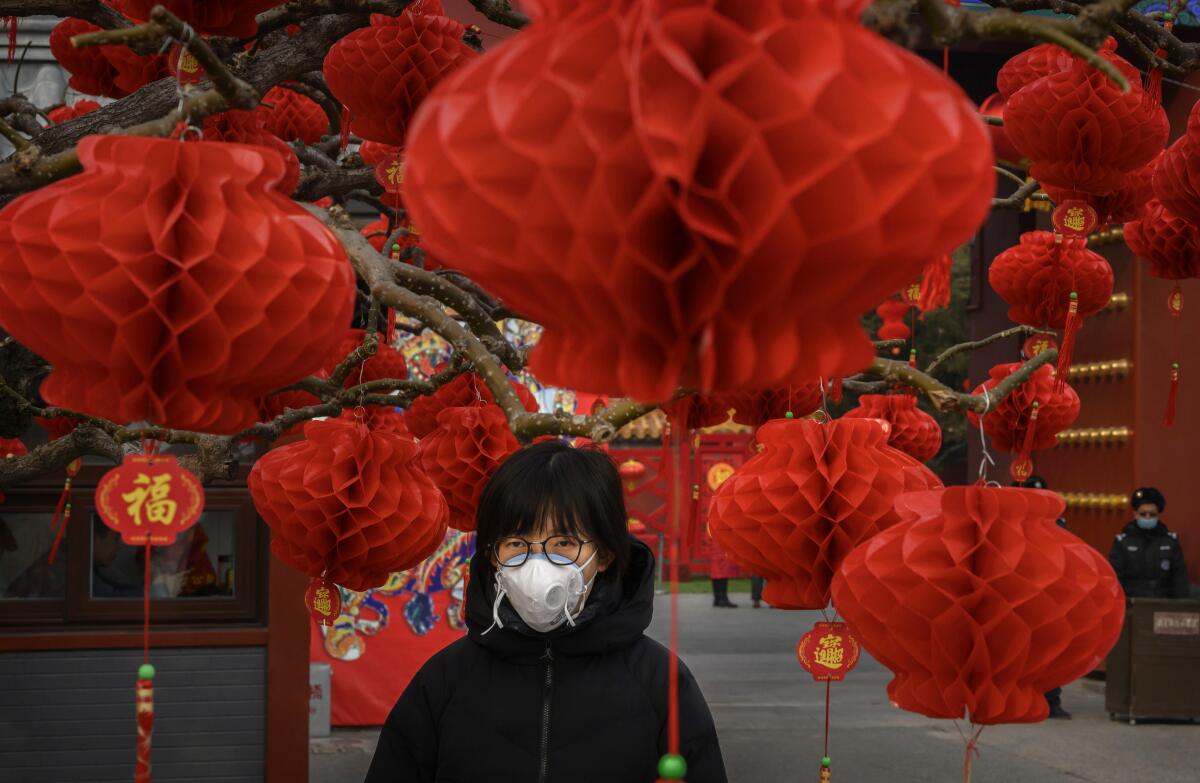
BEIJING — China on Monday expanded its sweeping efforts to contain a deadly virus, extending the Lunar New Year holiday to keep the public at home and avoid spreading infection as the death toll rose to 81.
Mongolia closed its vast border with China, and Hong Kong and Malaysia announced they would bar entry to visitors from the Chinese province at the center of the outbreak following a warning by medical officials that the virus’ ability to spread was growing. Travel agencies were ordered to cancel group tours nationwide, adding to the rising economic losses.
Stock markets around the world were down sharply Monday as the lockdown in Chinese cities was expected to stifle travel, shopping and business for millions of people. Though markets in much of Asia, including China, were closed for the Lunar New Year, they slumped more than 2% in Japan and across Europe. Wall Street was expected to drop on the open and the international price of oil was down a sharp 4%.
China’s increasingly drastic containment efforts began Wednesday with the suspension of plane, train and bus links to Wuhan, a city of 11 million people in central China where the virus was first detected last month. That lockdown has expanded to 17 cities with more than 50 million people in the most far-reaching disease-control measures ever imposed.
The end of the Lunar New Year holiday, China’s busiest travel season, was pushed back to Sunday from Thursday to “reduce mass gatherings” and “block the spread of the epidemic,” a Cabinet statement said.
The government of Shanghai, a metropolis of 25 million people and a global business center, extended the Lunar New Year holiday by an additional week within the city to Feb. 9. It ordered sports stadiums to close and religious events to be canceled.
Tens of millions of people in China and around Asia had been due to crowd into planes, trains and buses to return to work after visiting their hometowns or tourist sites for the holiday. Schools will postpone reopening until further notice, the Cabinet said.
The death toll rose Monday when the southern island province of Hainan in the South China Sea reported its first fatality, an 80-year-old woman whose family arrived from Wuhan on Jan. 17.
Hubei province, where Wuhan is located, has accounted for 76 of the deaths reported so far. There has been one each in Shanghai and the provinces of Hebei in the north, Heilongjiang in the northeast and Henan in central China.
The spread of the illness is being watched around the globe, with a small number of cases appearing in other countries. South Korea confirmed its fourth case Monday. Cases also have been confirmed in Thailand, Taiwan, Japan, the U.S., Vietnam, Singapore, Malaysia, Nepal, France, Canada and Australia.
The U.S. cases are in Washington state, Chicago, Southern California and Arizona.
China also reported eight cases in Hong Kong and five in Macao. Dr. Chuang Shuk-kwan, the head of Hong Kong’s communicable disease branch, said the city’s eight cases all have Hubei ties, so there was no no sign yet that it is spreading to Hong Kong’s general population.
Mongolia is the second country to close its border with China, following North Korea. Neither has reported any cases of the virus. Mongolia also closed its schools, universities and playgrounds for more than a month — until March 2.
China’s No. 2 leader, Premier Li Keqiang, visited Wuhan to “guide epidemic prevention work,” the Cabinet website said. Photos showed Li, in a blue smock and green face mask, meeting hospital employees.
Later, the premier, wearing a face mask and a dark windbreaker, visited a supermarket in the beleaguered city. Shoppers, also wearing masks, cheered to him, “Happy New Year!”
“To get the epidemic under control in Wuhan and the good health of people in Wuhan will be good news for the whole country,” Li told the crowd.
Elsewhere, the Potala Palace in Lhasa, the Tibetan capital, closed indefinitely to tourists on Monday. The former imperial palace in Beijing closed Friday until further notice and other major tourist sites also have shut down, including two of Hong Kong’s most popular tourist attractions, Hong Kong Disneyland and Ocean Park.
The disruption to industry and consumer spending threatens to depress Chinese economic growth that Beijing is struggling to shore up after it sank to a multidecade low of 6.1% last year. That could spread shock waves to other Asian economies that rely on China as a source of tourists and export markets.
Chinese regulators called on banks and insurers Monday to support the people and companies affected by the outbreak. The biggest impact will be on travel, hotels and restaurants, but Chinese retail spending, factory output and investment also would suffer if the outbreak and quarantines last, forecasters say.
The outbreak is a “notable downside risk” to growth, though it “could potentially be a high impact but short-lived event,” said Tommy Wu and Priyanka Kishore of Oxford Economics in a report.
They pointed to the example of the 2002-03 SARS outbreak, when economic activity plunged but recovered relatively quickly. The impact should be “less severe” than SARS because of faster official reaction and “increased transparency,” they said.
Abroad, economies including Hong Kong, Thailand, Vietnam, Singapore and the Philippines with big tourism industries that rely on Chinese travelers “seem most at risk,” said Wu and Kishore.
The U.S. Consulate in Wuhan said it was arranging to evacuate its diplomats and some American citizens Tuesday. The French government said it would fly its citizens in Wuhan to France and quarantine them there. Japan also was preparing to fly its citizens out of Wuhan.
French automaker PSA Peugeot Citroen, which has a factory in Wuhan, said it was moving foreign employees and their families by bus to be quarantined in another city.
German Foreign Minister Heiko Maas said his government is considering evacuating its estimated 90 citizens in Wuhan.
The National Health Commission said 2,744 cases in mainland China were confirmed by midnight Sunday. The youngest patient is a 9-month-old girl in Beijing.
China’s health minister, Ma Xiaowei, said the country was entering a “crucial stage” as “it seems like the ability of the virus to spread is getting stronger.”
President Xi Jinping has called the outbreak a grave situation and said the government was stepping up restrictions on travel and public gatherings while rushing medical staff and supplies to Wuhan.
The epidemic has revived memories of the SARS outbreak that originated in China and killed nearly 800 people. Then, Chinese authorities were criticized for reacting slowly and failing to disclose information. The government has responded more aggressively to the latest outbreak.
The National Health Commission said anyone traveling from Wuhan is required to register with community health stations and quarantine themselves at home for 14 days — the virus’ maximum incubation period.
Hong Kong announced it would bar entry to travelers from Hubei, starting Monday. Hong Kong residents returning from the area will be allowed into the territory but were told to quarantine themselves at home.
Also Sunday, Wuhan banned most vehicle use, including private cars, in downtown areas.
Wuhan is building two hospitals, one with 1,500 beds and another with 1,000, for the growing number of patients. The first is scheduled to be finished next week.
The coronavirus family includes the common cold but also more severe illnesses like SARS and Middle East Respiratory Syndrome. The new virus causes cold and flu-like symptoms, including cough and fever, and in more severe cases, shortness of breath and pneumonia.
The virus is thought to have spread to people from wild animals sold at a market in Wuhan. On Sunday, authorities banned trade in wild animals and urged people to stop eating their meat.
More to Read
Sign up for Essential California
The most important California stories and recommendations in your inbox every morning.
You may occasionally receive promotional content from the Los Angeles Times.
